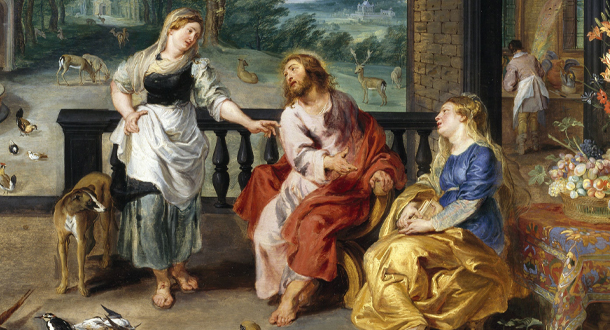
Memorial of Saints Martha, Mary, and Lazarus
Scripture:
Exodus 33:7-11; 34:5-9, 28
John 11:19-27
Reflection:
I am the resurrection and the life; whoever believes in me, even if he dies, will live, and anyone who lives and believes in me will never die. –John 11:25
Today’s reading from the Book of Exodus speaks of how the people prayed in the wilderness and describes God’s forgiveness. The first reading may seem disjointed, but it connects two sections of Exodus. It mentions the “meeting tent” where the Ark of the Covenant was kept. Moses’ time at the tent is a liturgical ritual where all the people stand outside of their own tents and worship as they saw the column of cloud, representing God’s presence. This showed their respect for God. At the end of that passage, Joshua, who would later lead the people into the Promised Land, did not step out of his tent. Was this a sign of disrespect? Perhaps, as the writer of Exodus then describes God’s mercy for “wickedness and crime and sin”. The passage then ends with Moses staying in the “meeting tent” fasting for forty days and nights. This action is related to atonement for sin, possibly atoning for the sin of the people. The writer of Exodus appears to reassure readers that God is merciful and forgives human shortcomings in worship and keeping the Covenant.
In the Gospel of John, Jesus and Martha engage in a conversation in which Martha expresses her belief in “the resurrection on the last day.” Her final statement is that she believes Jesus is “the Christ, the Son of God, the one who is coming into the world.” In the Gospels, accounts often describe healings as occurring through an individual’s faith or the faith of others. Martha, who is depicted in the Gospel of Luke as being occupied with tasks, is shown in the Gospel of John as having faith that Jesus can heal her brother or raise him from the dead. Jesus replies to her with one of the “I Am” statements. In this context, Martha acknowledges Jesus’ identity, and the narrative describes Jesus demonstrating care and compassion for her and Lazarus.
The exchange between Martha and Jesus may be considered a form of Covenant dialogue, wherein Martha expresses her faith and Jesus responds with the assurance of eternal life. Both Martha and the Apostles, while sincere in their beliefs, continued to seek a deeper understanding of the message presented to them. Unlike Moses, who was not permitted to fulfill certain roles, Jesus is identified as the one chosen by God to liberate individuals from sin and offer eternal life. Making declarations of faith, actively listening for divine response, and engaging in personal covenant dialogue can provide meaningful opportunities to strengthen one’s relationship with God and enhance spiritual growth.
Today’s readings present complex imagery and multiple dimensions of the development of the relationship described throughout Salvation history. The scriptural passages provide an opportunity for a more profound comprehension of themes such as mercy, compassion, and love, highlighting the significance of faith and worship in fostering this understanding.
Linda Schork is a theology teacher at Saint Xavier High School in Louisville, Kentucky.
